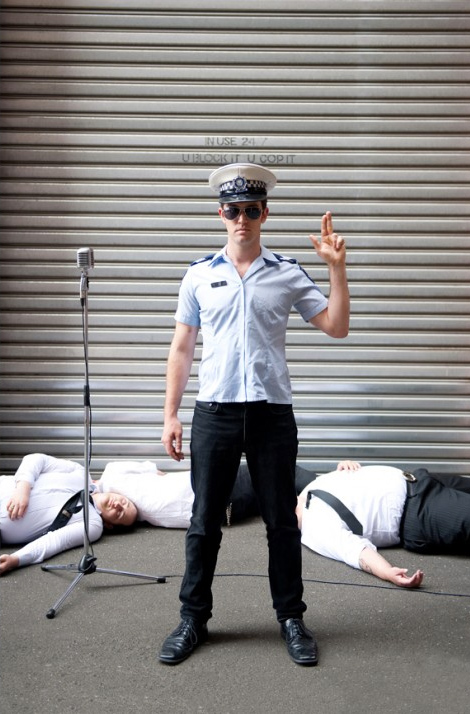a wicked take on political delusion

The Economist | Review
Alison Croggon | Theatre Notes
Dec 6, 2011
The great holiday guillotine has now slammed down across Ms TN’s diary, and so last week I saw my last shows for the year. And then, in the way of the these things, I promptly came down with a cold. I blame Melbourne’s increasingly absurd weather for this, as much as the exigencies of the end of the year: this city has always, admittedly, been proverbial for its changeability (“if you don’t like Melbourne’s weather, wait five minutes”) but in the past month it’s been pushing capriciousness to excess. I am thinking of investing in a porter to carry the galoshes, mac, heated gloves, snow goggles etc that are the essential accessories to any well-prepared Melbourne summer wardrobe. The stress of deciding what to wear has practically made me a slave to laudanum.
For all this, I managed to dress (even without a maid to secure my corsets) and saw three shows, all from independent companies (the last a co-production with the Malthouse, of which more in due course). I know I keep saying that diversity is the strength of our theatre culture, but I say so for good reason: it’s difficult to think of three more different productions, in approach, intent and theme. If they had all been diversely bad, Ms TN’s vapours might have become melodramatic, but the public was saved such tedious demonstrations. I also keep saying that if you like theatre, Melbourne is the place to be; and last week was a neat illustration of why.
I finally caught up with MKA, the new writer’s theatre that opened in September last year and has continued at a blinding pace since, with punishing schedules of readings and productions, under the artistic directorship of the magnificently named Tobias Manderson-Galvin. Taking a leaf from the original Royal Court, its avowed intent is the development of plays through productions and readings, and it has been making waves all year through a series of temporary venues. The Economist, by Manderson-Galvin himself, was MKA’s final show for 2011.
This production made waves of a different kind, as it is based on the case of Anders Behring Breivik, the Norwegian right wing extremist and racist who murdered 77 people in July this year. The play caused a brief tabloid sensation before it opened when Manderson-Galvin was pilloried for saying that Breivik was no more insane than John Howard. The far right is touchy about Breivik, for good reason: he justified his horrific crimes in a rambling manifesto that quoted some of our own rabid luminaries, and which rehearsed some very familiar rhetoric about the fall of the west, the rise of Islam, and the evils of “cultural Marxism” and feminism.
In The Economist. our hero is the fictional – but not so far from factual – Andrew Bolt Berwick. (Andrew Berwick was one of Breivik’s pseudonyms). Directed as a work of agitprop by Van Badham, it is poor theatre at its best: performed in the corner of a hall, with props hanging from the wall marked by red crosses, it’s a fluidly satirical take on the political delusions of extremism, which opened just as Breivik was diagnosed as a paranoid schizophrenic by the Norwegian justice system.
Breivik’s diagnosis of insanity prompts the question why, given the consciously inflammatory and frankly psychotic nature of so much extreme right wing discourse, he is considered a lunatic exception, while parallel Islamic extremists – Osama Bin Laden, for example – are considered to be emblematic of the entirety of Islam. Surely a rational analysis would find that Bin Laden might be considered equally insane, equally exceptional (or, alternatively, that Breivik is equally typical)? Andrew Bolt warns, just as Breivik did, against the threat Islam (or socialism, or feminism) poses to western civilisation, and equates Islam with terrorism. No one is suggesting that Bolt is a terrorist, but his contempt for accuracy and evidence in his arguments is symptomatic of an endemic toxicity in political discussion. And it’s a contempt that itself produces delusion.
At issue is whether Breivik’s violence is a logical extension of extreme rhetoric or whether he is a monstrous and insane exception whose delusions had nothing to do with his ideology. It’s a fascinating question which goes to the heart of contemporary democratic politics, especially since the extreme Right began to go mainstream in the 1990s.
An unnamed aide to George W. Bush made a central plank of political delusion explicit in a Baudrillardian quote in the New York Times in 2004: “We’re an empire now, and when we act, we create our own reality. And while you’re studying that reality – judiciously, as you will – we’ll act again, creating other new realities, which you can study too, and that’s how things will sort out. We’re history’s actors… and you, all of you, will be left to just study what we do.” Reality, claims this delusion, is what “we” make it; uncomfortable facts – such as the debacle of the Iraq invasion – can be airbrushed away.
FOX News, shock jocks and fact-happy zones such as Bolt’s column are all symptoms of this rejection of evidence in favour of an ideologically-shaped “reality”, in which the ideals of the Enlightenment are all sucked into a black hole of irrationality. As Goya pointed out so presciently, the sleep of reason produces monsters: folly and ignorance are not only what happens when reason is abandoned, but are its dark subconscious. The rise of fundamentalisms is not a rejection of modernity, but one of its inevitable results.
The skewed debates about climate change, the global economy, even evolution, are all symptoms of this radical retreat from evidential fact: an aggressively expressed “reality”, as our own Alan Jones demonstrates so often, claims to trump evidence every time. In today’s media overload the soundbite reigns supreme, and complex argument and reasoned thinking do very badly. As Goebbels understood so well, paranoia sells: people are afraid of the modern world, and retreat into easily-understood simplicities that confirm their deepest fears and desires.
It’s these larger questions that inform The Economist. Manderson-Galvin suspends judgment on Breivik, and instead explores his paranoid world with wit and some grim insight, collaging and extending from Breivik’s own documentation. Some of it – Breivik’s obsession with the Knights Templar, for instance – is frankly unhinged. Some – his nagging sense of inferiority, his use of plastic surgery to make him look more Aryan – is pitiful. Some – the alienation expressed in his obsession with World of Warcraft – is the stuff of every cliche about alienated geeks. And some, to anyone with the slightest knowledge of contemporary right wing radicalism, from Glenn Beck to the English Defence League, is sinisterly familiar. Step by inexorable step, we watch Berwick’s descent into delusion, and from delusion into horror.
The play is sharply performed by six actors, each crossing character and gender, and features some very nifty chorus work, with the very blonde Zoey Dawson playing Berwick. Badham’s direction is swift, moving from horror to comedy in an eyeblink; in a Brechtian touch, settings are announced at the beginning of every scene, and it’s punctuated by song. It’s almost guiltily entertaining, permitting its bleak subtext to bloom darkly in the minds of its audience. Most importantly, it does us the courtesy of refusing to moralise: we are left to reach our own conclusions. Highly recommended.
“A wicked take on political delusion.”
